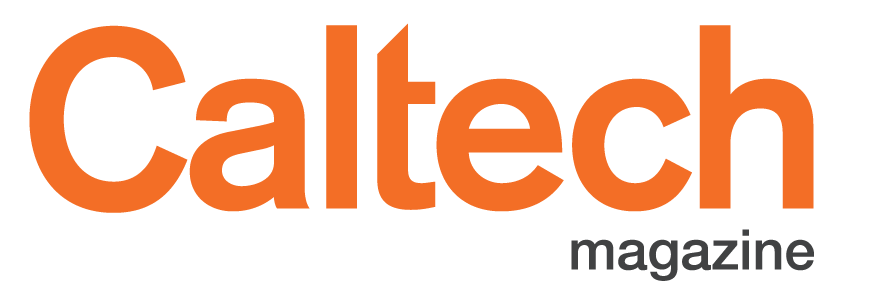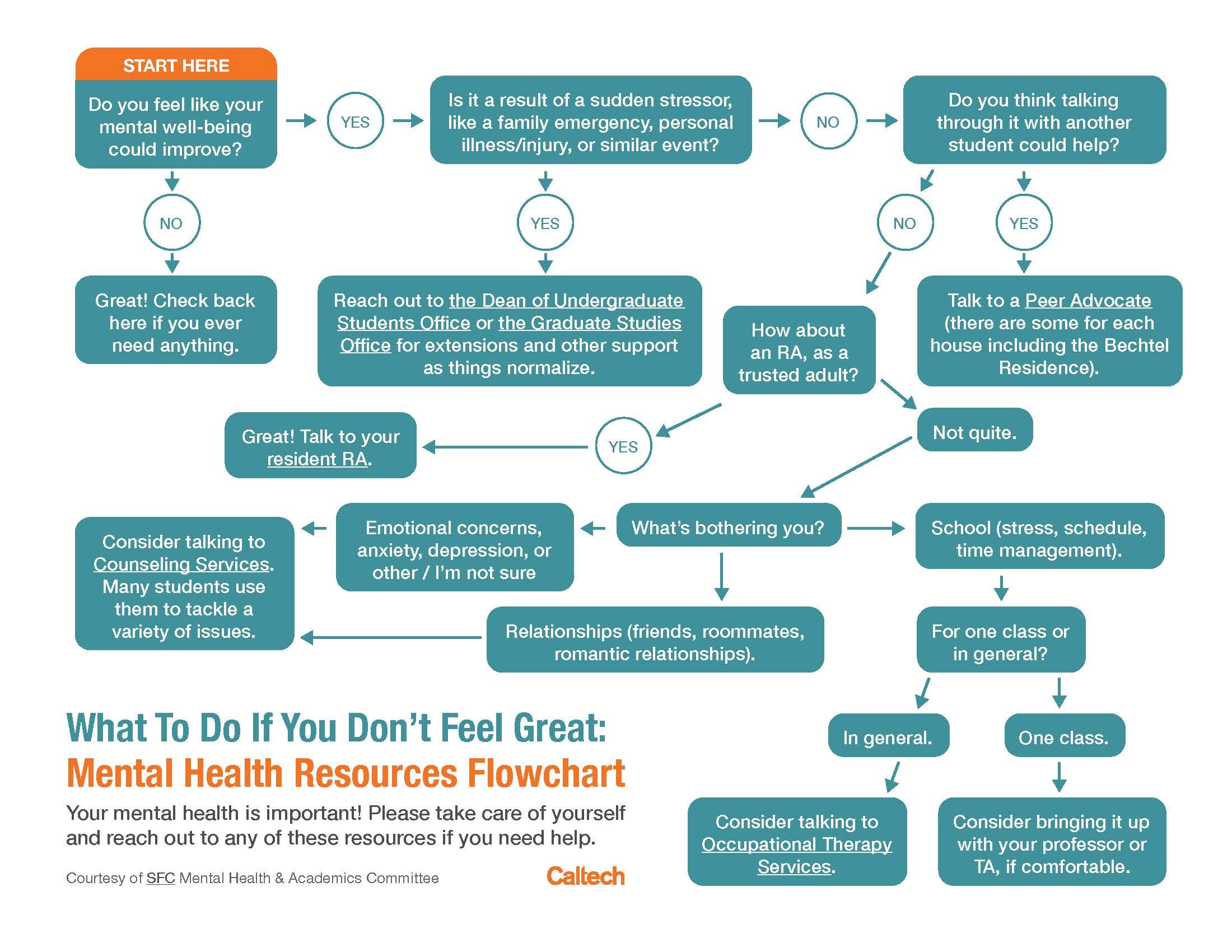It’s OK to not be OK
No one should suffer in silence. Caltech supports the mental health of its students in a variety of ways, including programming designed to build positive habits and meaningful relationships as well as crisis counseling to ensure help is available 24/7.
We spoke to professionals from Student Wellness Services (SWS) and the Caltech Center for Inclusion and Diversity (CCID) about some of the resources available to the Caltech community.
Student Wellness Services
Lee H. Coleman, clinical director of counseling services, Counseling Center
Can you provide an overview of Student Wellness Services’ role at Caltech?
Student Wellness Services is made up of health services, counseling services, and occupational therapy. We provide a number of direct services, including individual and group counseling and psychotherapy as well as consultations to members of the Caltech community who may be worried or concerned about friends or other students. We do a large number of workshops and trainings on a wide variety of topics. We also provide crisis services during the day and after hours as well.
When people think of us, they mostly think of counseling because it's the largest part of what we do, but we provide a lot of different services to the community. We're also a very active partner in consultation with faculty and staff, because they're the ones on the front lines working with the students.
What are some of the most common issues that students discuss with you?
Anxiety is the number one mental health concern in the country by far, and depression is in second place. People have this idea that Caltech students are more depressed, more anxious, more suicidal than students at other schools. And the good news is the data simply doesn't support that. These are serious problems, to be sure, but the distress that our students feel seems to be in line with the national picture instead of reflecting something specific to Caltech.
Are these issues more acute among first-year students, and did the pandemic make things worse?
The first year of college is a time of massive transition. Students are often going away from home for the first time. They're learning how to live more independently for the first time. Many are leaving their home countries for the first time and coming to the U.S. For those students who began while we were learning remotely, I think there was also a lot of disappointment that maybe the stereotypical college experience they had hoped for didn't pan out.
Developmentally, in the first year of college, there's so much going on. It's why it's such a wonderful time for faculty and staff to meet with and get to know and build a relationship with incoming students. Later on, if things start to go poorly, if students start to run into academic difficulties, they've already established a connection with friends, with professionals, with professors, with TAs whom they can turn to for support.
Are there other resources to help them during their first year?
I also help co-lead the Peer Advocate Program, where we train undergraduate students in the houses to be skilled peer helpers who are trained in empathic listening, emotional regulation skills, and to know when to pass concerns up to a higher level of care. Even if students don't need help right away, that's a great time to build those relationships, because then they know they're there if they should need them later. Our office also puts on the Caltech Connect suicide prevention training, and we offer multiple opportunities to take that every term for staff, postdocs, faculty, and students.
How do you work with students who tell you they’re having suicidal thoughts?
The reality is that with a lot of life stresses and emotional difficulties, people often do have thoughts about suicide, and it's really important that we make that a conversation instead of something to keep hidden away. There's often this fear, even though we actively try to combat these rumors, that if people show up in our office and talk about having suicidal thoughts then they're going to get kicked out of school or put in the hospital. It's simply not the case. The only thing it does is start a conversation, and it's important for us to have people know that. We will always work with the student to come up with very specific safety and stabilization plans for managing their suicidality outside of a hospital setting, if at all possible. We meet with them, and we get them to meet with the deans to talk about what they need, what wasn't working before, what needs to change in the level of care, what accommodations they might need academically, and so on.
Caltech Center for Inclusion and Diversity
Tashiana Bryant-Myrick, Director
Monique Thomas, Program manager for advocacy and campus relations
What is CCID’s role with students on campus?
Bryant-Myrick: Our Black students, students of color, and marginalized students have experiences that are very unique to Caltech. Caltech is being intentional about bringing in the students who are historically excluded and who may not have seen Caltech as an institution to pursue until recently. If we're bringing them here, we need to foster a sense of belonging so they're successful here.
What does that success look like from your perspective?
Bryant-Myrick: What matters to me is your experience here. We want to get you to graduation, but I want you to actually say that it was a good experience. It's not easy to get into Caltech, so you clearly have the skills to be successful if you were accepted. However, did you like it? The goal is not met if you get to graduation and say, "I never want to see those folks ever again."
Success is feeling that you belong here. Success is also holistic development through co-curricular experiences and involvement in research. I do think that the CCID has provided those opportunities for cultural experiences and exchange, identity development, leadership development, advocacy, allyship, DEI education, and community. Students come to us to help them find community and other systems of support.
What are some ways CCID helps them find community?
Thomas: I advise the Black Scientists and Engineers of Caltech, Black Ladies Association of Caltech, and our Society of Women in Engineering. We have student clubs that we advise targeted toward women, LGBTQIA, Latinx, and Black students, and each of those has an undergrad component, where the upper-level students are reaching out to and supporting first-year students coming in so that they don't feel so isolated.
I also work with FSRI, the Freshman Summer Research Institute, which is where we get a ton of our diverse students. The students, who have already been admitted, go through this program during the summer that provides them with opportunities for research, an introduction to the math curriculum, leadership and conflict resolution, and just how to be an adult on a campus, among other things. Then we take them on excursions to places like Disneyland. We do an MTA trip sometimes, where we take them out and they learn the Metro system and Los Angeles museums and other enriching things. We'll also invite the deans to come. One of the deans came to The Huntington with us, and we told the students, "We want you to see them in a fun setting so that when you're in trouble and you need help, you're not afraid to go to them."
FSRI is now a year-round program. We started doing Sunday dinners throughout the year. We had a group that would get together, and we'd provide meals for them. Sometimes, we would have a speaker talk to them about time management and work in some programming. Sometimes it was just watching WandaVision and saying, “Let's decompress and just be together and support each other.” That’s when they would talk about their imposter syndrome and other things.
Is imposter syndrome common among first-year students in particular?
Thomas: Many of our students, of all generations, have some sense of imposter syndrome just because you're with the best of the best. But when you were the first or the only in your family, and you get to a place like Caltech, it becomes apparent. I've heard from first-year students, particularly first-gen students of color, and speaking in my own experience as a Black woman, I am very much a part of a collective, a community-based culture. When I went to college, the community was going with me. My family, folks in the neighborhood, I'm sort of representing them. And even coming to work at Caltech, my family feels like they work at Caltech. What I found, particularly with students of color, is that's not the experience they were having in the houses or with their roommates. We want to help provide those structures for community for them.
For more information on Caltech’s Student Wellness Services, or if you need immediate support, visit: wellness.caltech.edu.
For more information on the Caltech Center for Inclusion and Diversity, visit: diversity.caltech.edu.


